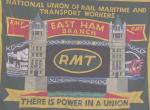LTRC Green Officer update
Toxic London
A new report has revealed that air pollution in London has reached dangerous levels, shattering EU limits for safe levels of NO2 (Nitrogen Dioxide) in the air.
The junction of Oxford Street and Orchard Road, close to Oxford Circus, Bond Street, and Marble Arch stations, is the seventh most polluted place in the UK. Last year, Boris Johnson dismissed claims that Oxford Street was dangerously polluted as “bollocks” (see this Evening Standard article for more).
Murad Qureshi, London Assembly Member and the Environment Spokesperson for the GLA Labour Group, estimates that air pollution could contribute to the death of 35,000 Londoners over the next five years (see here for more info).
Reducing emissions and cleaning up our air is an issue for RMT members in London for a variety of reasons. We live and work here; that 35,000 could include us, our friends, or members of our families. But it’s also an issue for us as transport workers. An expansion of public transport (necessarily involving an increase in staffing levels) and a massive reduction in fares would promote cleaner forms of transit, and disincentivise car use. Instead, Boris is pushing cuts schemes that will see staff slashed and funding reduced for a public transport system that’s already creaking.
Campaign Against Climate Change demo
20,000 people joined the Campaign Against Climate Change’s demonstration on Saturday 7 March, many of them young people and students. It was great to see such a vibrant march, with groups mobilising from all over the country. There’ll be more climate-movement activity as the year goes on, building up to the UN’s Climate Change Conference in Paris in December.
The climate movement needs working-class politics if it’s going to win. Workers (in both frontline, high-emissions industries such as fossil-fuel-based energy generation, aviation, and manufacturing, and in “green” industries like public transport and renewables) hold a fundamental and unique power to demand industrial and social change towards a low-carbon economy.
In the 1970s, workers at the Lucas Aerospace industrial complex responded to a management cuts offensive by producing a “workers’ plan” for how the factory’s productive capacity could be repurposed to produce hospital equipment, rail-road hybrid vehicles, renewable energy technology, and other socially-useful goods, rather than military hardware. Imagine if workers currently employed in coal-fired power stations, or as engineers on fracking sites, refused to let their skills and labour-power be used in environmentally-unsustainable ways, and produced their own “workers’ plans” for transition and conversion. As a union representing workers in a sector that will need to be massively expanded in order to reduce emissions, we have an immediate interest in developing a radical working-class climate politics. RMT can take the lead in helping the climate movement develop the class-struggle and labour-movement focus it needs.
Opposing nuclear dumping on Mersea Island
The East Ham branch recently passed the following motion, which I think speaks for itself. I’ll be liaising with affected members in East Ham branch to ensure that the union takes up this campaign at the appropriate level.
OPPOSE "FED" WASTE DUMPING ON MERSEA ISLAND
This branch notes:
This branch believes:
This branch further believes:
This branch resolves:
A new Green Officer: it could be you!
At the 2015 AGM of the London Transport Regional Council, I was elected (in absentia) as Young Members’ Officer. However, as there were no candidates for the Green Officer position I am continuing in that role on a temporary, interim basis until another candidate comes forward.
Could it be you? The role can be whatever you make it, but should involve keeping RMT members in the London Transport Region updated about environmental and climate-movement issues, critiquing the often-hypocritical posturing of our employers and Mayor (who claim to be committed to tackling climate change but frequently reduce the issue to one of merely turning the lights out rather than serious social change), and, ideally, working within the climate movement to promote a working-class and labour-movement focus.
If you are interested in becoming LTRC Green Officer, email LTRC Secretary Eamonn Lynch here.
- 4094 reads





